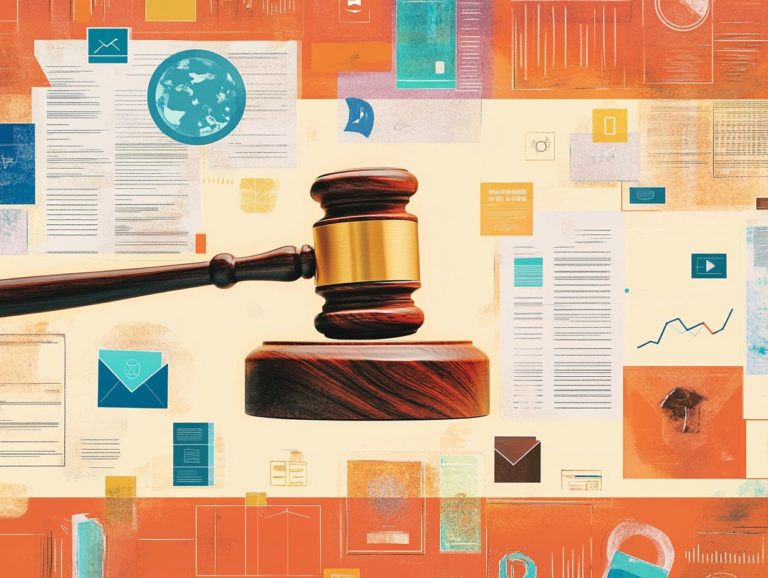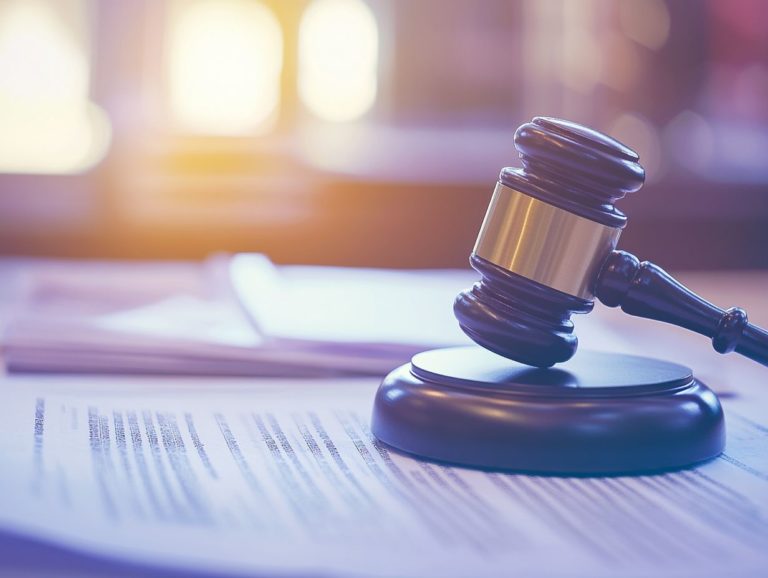5 Questions to Ask Before Starting IP Litigation
Navigating the complexities of intellectual property (IP) litigation can feel overwhelming. Before you plunge into the fray, it’s vital to ask the right questions to ensure you’re making informed decisions.
Consider these five key questions to guide your approach:
- What is the basis of your claim?
- How robust is your evidence?
- What are the potential costs and risks?
- Are there viable settlement opportunities?
- What is your desired timeline?
You ll also want to understand the IP litigation process, familiarize yourself with common defenses, and explore strategies for safeguarding your assets. Dive into these essential topics to empower your decision-making in the intricate world of IP litigation.
Contents
- Key Takeaways:
- 1. What Is the Basis of Your Claim?
- 2. Do You Have Sufficient Evidence to Support Your Claim?
- 3. What Are the Potential Costs and Risks Involved?
- 4. Is There a Possibility for Settlement?
- 5. What Is Your Timeline for the Litigation?
- What Are the Key Steps in the IP Litigation Process?
- Preguntas Frecuentes
- Qu es el litigio de propiedad intelectual y por qu es importante hacer preguntas antes de comenzar?
- Cu les son los costos potenciales asociados con el litigio de propiedad intelectual?
- Cu les son los riesgos del litigio de propiedad intelectual?
- Cu l es la fortaleza de mi caso?
- Qu alternativas al litigio deber an considerarse?
- C mo puedo prepararme mejor para el litigio de propiedad intelectual?
Key Takeaways:

- Understand the basis of your claim before pursuing IP litigation.
- Gather sufficient evidence to support your claim and increase your chances of success.
- Consider the potential costs and risks involved before starting IP litigation.
1. What Is the Basis of Your Claim?
Understanding the foundation of your claim is essential in the intricate world of patent litigation and intellectual property. This knowledge sets the stage for your legal strategy and enhances your chances of successfully navigating the complexities of the U.S. office that oversees patents and trademarks for businesses.
Having a comprehensive grasp of different legal precedents can significantly strengthen your argument, especially when distinguishing between patents, trademarks, and copyrights. Each type of intellectual property has its own unique standards and protections, requiring a customized approach when formulating your claims.
Conduct thorough due diligence; this helps you identify potential pitfalls and strengthens your risk management strategies. This ensures you are fully equipped to tackle any challenges that arise. By weaving these elements into your litigation strategy, you can build a robust defense that addresses all facets of intellectual property law, ultimately increasing your chances of achieving a favorable outcome.
2. Do You Have Sufficient Evidence to Support Your Claim?
In patent litigation, the strength of your evidence is paramount. It directly impacts your attorney s ability to construct a compelling case and skillfully handle legal disputes that may arise.
A robust strategy typically includes various forms of evidence, such as thorough documentation, credible witness testimony, and expert analysis that clarifies the intricate details of the technology involved. Each type of evidence plays a crucial role in bolstering the validity of your claims.
Your attorney’s qualifications are equally important. Their experience allows them to distill complex information and present it effectively in court. Client references can enhance your credibility during litigation, providing insights into your attorney’s track record and proficiency in managing similar cases. This fosters confidence in possible outcomes.
3. What Are the Potential Costs and Risks Involved?
Understanding the costs and risks of patent litigation is essential. This is true whether you are a technology company or a law firm. This insight allows you to craft effective investment strategies and safeguard your intellectual property rights.
These costs can quickly accumulate, including significant attorney fees that can escalate alarmingly fast, along with court costs that often rise based on the case’s complexity and duration. If a company is found to infringe on a patent, they could face substantial damages, further straining financial resources.
To tackle these financial implications, implement effective risk management practices. These practices help identify potential litigation threats and enable you to allocate funds wisely to cushion against unexpected expenses.
By establishing a transparent fee structure, you enhance client relationships. This ensures everyone is informed about potential costs from the outset and can plan accordingly.
4. Is There a Possibility for Settlement?

Exploring the possibility of settlement in patent litigation can save you both time and costs while fostering effective partnerships between the parties involved. It reduces the strain of prolonged legal disputes, allowing for a more productive environment.
By choosing to settle, you can maintain a level of confidentiality that often disappears in traditional litigation. This confidentiality can be a game-changer for your competitive edge, safeguarding sensitive information and trade secrets. Enhancing your reputation is also crucial, as it can take a hit during public trials.
Engaging in direct negotiations gives you control over the outcome that a court may not provide. You have the opportunity to communicate openly, paving the way for a more personalized resolution. The nature of your communication will significantly impact the negotiation process; a collaborative approach often yields better results than a confrontational one.
When you consider licensing agreements alongside settlements, you broaden the scope of negotiations. This opens doors to win-win agreements that further facilitate amicable resolutions.
5. What Is Your Timeline for the Litigation?
Establishing a clear timeline for patent litigation can significantly shape the strategy your attorney employs and the overall management of legal disputes, particularly in fast-paced industries like technology.
By understanding the typical phases ranging from initial filing and discovery (the stage where both sides share important information) to motions, trials, and eventual resolution you can better prepare yourself and your legal team for what lies ahead.
An experienced attorney will navigate these stages with finesse, potentially shortening the duration of contested matters.
Keep in mind that external factors, such as rapid technological advancements, can accelerate the evolution of arguments, while increased market competition might push parties to seek quicker settlements to maintain their competitive edge.
These dynamics highlight the essential role of a well-thought-out timeline in guiding the strategic decisions made throughout the litigation process.
What Are the Key Steps in the IP Litigation Process?
The IP litigation process encompasses several essential steps, including initial consultation, claim preparation, discovery, and trial. Each stage requires a solid grasp of legal compliance and the qualifications of your attorney to navigate effectively.
Navigating these phases is paramount for safeguarding the rights to your inventions and creations and ensuring that any infringement is properly addressed.
It all begins with a comprehensive consultation with an experienced attorney to lay the groundwork for your understanding of the nuances of your case and the best course of action.
Next, meticulous preparation of claims is crucial; this phase calls for detailed evidence collection and strategic legal arguments that can set the stage for success.
During discovery, both parties exchange vital information, a process that greatly influences the direction of the trial.
Ultimately, throughout each of these steps, having a knowledgeable legal professional who understands court procedures can significantly shape the outcome. Their insights will be invaluable in ensuring compliance with all legal standards, guiding you toward a favorable resolution.
What Are the Different Types of IP Litigation?
IP litigation covers a range of issues, including patent litigation, trademark registration disputes, copyright protection cases, and trade secrets conflicts. Each requires a unique set of expertise and strategies. Grasping these distinctions is vital for effective legal representation, as each category adheres to its own legal standards and principles.
For example, patent litigation often revolves around intricate technological innovations, demanding a thorough understanding of both the underlying science and the patent laws that govern it. Trademark disputes center on brand identity and consumer confusion, requiring a keen awareness of marketing practices and public perception.
Copyright cases delve into the complexities of creative expression, spotlighting originality and infringement concerns. Trade secrets litigation, meanwhile, focuses on safeguarding confidential business information, which can introduce unique challenges regarding evidentiary requirements and workplace dynamics.
Therefore, customizing strategies to fit the specific nature of intellectual property is crucial for achieving the best possible outcomes.
What Are the Common Defenses in IP Litigation?

Common defenses in patent litigation focus on key issues like prior art, non-infringement, and patent invalidity. Understanding these concepts is essential for navigating the legal landscape and protecting innovation rights.
These defenses safeguard the interests of individuals and organizations facing infringement accusations.
Take prior art, for example. It demonstrates that your invention was already known, effectively invalidating the contested patent.
In KSR International Co. v. Teleflex Inc., the Supreme Court emphasized the importance of obviousness criteria, showing how experienced attorneys navigate legal complexities.
Showcasing non-infringement requires careful examination of product design and patent claims. An attorney s understanding of technical language is vital in crafting persuasive arguments.
Harnessing expert legal insight greatly enhances the effectiveness of these defenses.
How Can a Business Protect Their Intellectual Property to Avoid Litigation?
To steer clear of litigation pitfalls and protect your business, adopt proactive strategies for safeguarding your intellectual property. Implement robust asset protection measures and effective risk management practices.
This approach not only helps protect your innovative ideas and unique products; it also maintains your competitive edge in today’s fast-paced marketplace.
Craft a comprehensive business strategy that includes technology licensing, trademark registration, and copyright protection to shield your valuable IP assets from disputes.
These proactive measures can prevent costly legal battles and ensure your creative works and proprietary information remain secure. This security allows you to focus more on growth and innovation.
What Are the Most Common Issues in IP Litigation?
IP litigation presents various challenges, from the intricacies of patent applications to proving infringement. Successfully navigating these disputes requires engaging highly qualified attorneys.
Common issues manifest as ambiguous patent language inviting different interpretations or challenges in gathering evidence to demonstrate infringement. A claim may hinge on nuanced technological details that only an experienced legal mind can unravel, emphasizing the critical role of skilled attorneys.
Any misstep in procedure or strategy could lead to costly delays and unfavorable rulings, highlighting the necessity of involving counsel with a strong background in intellectual property law.
A well-versed attorney not only mitigates these challenges but also positions you favorably within complex legal landscapes.
How Can a Business Choose the Right Attorney for IP Litigation?
Choosing the right attorney for IP litigation is crucial and can significantly influence the outcome of your legal conflicts. Align the attorney s qualifications with your business’s unique needs.
When selecting an attorney, evaluate key factors. Look for specific experience with intellectual property cases, as expertise varies between patents, trademarks, and copyrights.
Client references offer invaluable insights into an attorney’s track record and their approach to handling cases. The attorney’s communication style should facilitate clear understanding of complex concepts and provide the support needed throughout the process.
Effective management of your IP portfolio is vital. A well-maintained portfolio strengthens your legal position and reflects the attorney s ability to guide you in protecting your intellectual assets.
Preguntas Frecuentes

Qu es el litigio de propiedad intelectual y por qu es importante hacer preguntas antes de comenzar?
El litigio de propiedad intelectual se refiere a acciones legales para proteger los derechos de propiedad intelectual. Hacer preguntas antes de comenzar ayuda a garantizar que el proceso se aborde de manera informada y estrat gica.
Cu les son los costos potenciales asociados con el litigio de propiedad intelectual?
Los costos del litigio pueden variar seg n el caso y la complejidad de los asuntos legales. Es vital entender los costos antes de comenzar.
Cu les son los riesgos del litigio de propiedad intelectual?
Existen varios riesgos, como no proteger sus derechos, gastar mucho en abogados y da ar relaciones con competidores. Es crucial evaluar estos riesgos antes de actuar.
Cu l es la fortaleza de mi caso?
Esta es una pregunta crucial antes de iniciar el litigio. Es importante evaluar la fortaleza de su caso considerando la calidad de la evidencia y la probabilidad de xito.
Qu alternativas al litigio deber an considerarse?
Antes de comenzar el litigio, explore opciones como la negociaci n, la mediaci n (una forma de resolver disputas sin ir a juicio) o el arbitraje. Estos m todos pueden ser m s rentables y eficientes.
C mo puedo prepararme mejor para el litigio de propiedad intelectual?
Para prepararse, re na y organice todos los documentos y evidencias relevantes. Comprenda bien los asuntos legales y colabore con un abogado de propiedad intelectual experimentado que pueda guiarlo en el proceso.






